
Blue Hills Reservation is a 7,000-acre (2,800 ha) state park in Norfolk County, Massachusetts in the United States. Managed by the Massachusetts Department of Conservation and Recreation, it covers parts of Milton, Quincy, Braintree, Canton, Randolph, and Dedham. Located approximately ten miles south of downtown Boston, the reservation is one of the largest parcels of undeveloped conservation land within the Greater Boston metropolitan area. The park's varied terrain and scenic views make it a popular destination for hikers from the Boston area.

The Daniel Webster Wildlife Sanctuary is a sanctuary owned by the Massachusetts Audubon Society, the largest conservation organization in New England, in the town of Marshfield, Massachusetts. The sanctuary, formerly the farm of Edward Dwyer, statesman Daniel Webster and the William Thomas family of Marshfield, the first English landowner to live on the sanctuary land, was purchased by Mass Audubon in 1984 thanks to the volunteer efforts of the Committee for the Preservation of Dwyer Farm for the People of Marshfield. The sanctuary contains 507 acres (2.1 km2) of mixed cultural grasslands, red maple swamps, a five-tiered wet panne, Webster Pond and a section of the Green Harbor River. It is the site of the annual Daniel Webster Farm Day celebration. Surrounding lands owned by the town of Marshfield and the Marshfield Airport increase the local open space area to more than 1000 acres (4 km2).

The North River Wildlife Sanctuary is a wildlife sanctuary, owned by the Massachusetts Audubon Society, located on the North River in the town of Marshfield, Massachusetts. The sanctuary contains 184 acres (0.74 km2) of mixed cultural grasslands, red maple swamps, oak-pine woodland, and access to the river. The North River Wildlife Sanctuary came to Mass Audubon as a gift of the Killam and Rodgers families in 1977.

The Massachusetts Audubon Society, commonly known as Mass Audubon, founded in 1896 by Harriet Hemenway and Minna B. Hall and headquartered in Lincoln, Massachusetts, is a nonprofit organization dedicated to "protecting the nature of Massachusetts". Mass Audubon is independent of the National Audubon Society (NAS), and was founded earlier than the NAS. Mass Audubon protects more than 38,000 acres of land throughout Massachusetts, saving birds and other wildlife, and making nature accessible to all with its wildlife sanctuaries and 20 nature centers.

The Ipswich River Wildlife Sanctuary, which is one of the Massachusetts Audubon Society’s largest wildlife sanctuaries, is located in Topsfield and Wenham, Massachusetts. Much of its 1,955-acre (7.91 km2) landscape was created by a glacier 15,000 years ago.
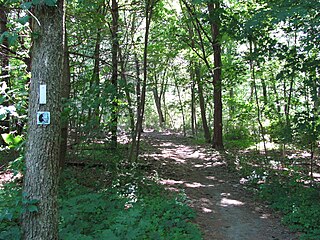
The Bay Circuit Trail and Greenway or Bay Circuit is a Massachusetts rail trail and greenway connecting the outlying suburbs of Boston from Plum Island in Newburyport to Kingston Bay in Duxbury, a distance of 200 miles (320 km).
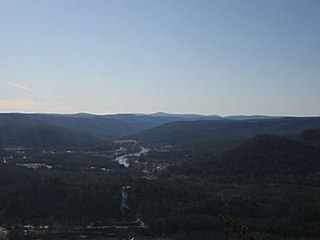
High Ledges is a wildlife sanctuary located in Shelburne, Massachusetts. The 587-acre (2.38 km2) property, located on the northern portion of Massaemett Mountain, is owned by Massachusetts Audubon Society.

Harvard Forest is an ecological research area of 3,000 acres (12 km2) owned and managed by Harvard University and located in Petersham, Massachusetts. The property, in operation since 1907, includes one of North America's oldest managed forests, educational and research facilities, a museum, and recreation trails. Harvard Forest is open to the public.

Moose Hill Farm is a 347-acre (140 ha) open space preserve and historic farm complex located in Sharon, Massachusetts near the 450 feet (140 m) summit of Moose Hill. The property, acquired in 2005 by the land conservation non-profit organization The Trustees of Reservations, includes farmland, woodlots, 21 farm buildings, hiking trails, stands of mature American Chestnuts, and scenic vistas of the Boston skyline. Moose Hill Farm is part of a larger area of protected open space including state land and the Massachusetts Audubon Society's Moose Hill Wildlife Sanctuary.

Rocky Woods is a 491-acre (199 ha) open space preserve located in Medfield, Massachusetts. The preserve, managed by the land conservation non-profit organization The Trustees of Reservations, is notable for its rugged terrain. Rocky Woods offers 6.5 miles (10.5 km) of trails and former woods roads available for hiking, horseback riding, mountain biking, dog walking, catch and release fishing, camping, snowshoeing and cross country skiing. The preserve is part of a larger area of protected open space including the abutting Fork Factory Brook preserve, also managed by The Trustees of Reservations.
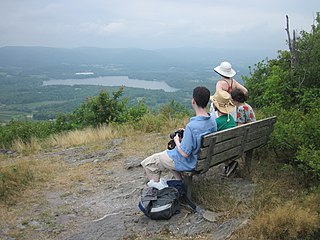
Yokun Ridge consisting mainly of West Stockbridge Mountain and the Lenox Mountain massif, is a term sometimes used for this ten-mile stretch of the Taconic Mountains south of Pittfield, Mass. The term was invented in 1971 by the private Berkshire Natural Resources Council to draw public attention to what it perceived as the area's geographical continuity. and was accepted in 2009 by the United States Board on Geographic Names. Yokun Ridge contains a conservation planning area called the Stockbridge-Yokun Ridge Reserve designated in 1993 by the U.S. Forest Service under its Forest Legacy Program. The area is notable for its recreational and scenic value, as well as its conserved land and proximity to the tourist attractions of Lenox and Stockbridge. Yokun Ridge is located within West Stockbridge, Stockbridge, Lenox, Richmond, and Pittsfield, Massachusetts. Approximately one-third of the zone is protected as open space reserve, municipal watershed, and wildlife sanctuary.

Moose Hill Wildlife Sanctuary is a 1,971 acres (798 ha) wildlife sanctuary located in Sharon, Massachusetts. The property is the oldest property of the Massachusetts Audubon Society, established in 1916. It is adjacent to Moose Hill Farm, which is owned by the Trustees of Reservations.

The Connecticut Audubon Society, founded in 1898 and headquartered in Fairfield, Connecticut, is a nonprofit organization dedicated to "conserving Connecticut’s environment through science-based education and advocacy focused on the state’s bird populations and habitats." Connecticut Audubon Society is independent of the National Audubon Society (NAS), just as in the neighboring state of Massachusetts, where Massachusetts Audubon Society is independent of the NAS.

Willard Pond is a small, protected lake in Antrim, New Hampshire, United States. The lake, located in southwestern New Hampshire, is about 108 acres (44 ha) in size with an average depth of 25 feet (7.6 m) and a maximum depth of 58 feet (18 m). No petroleum motors are allowed, and fly fishing is the only form of fishing allowed. It is part of the dePierrefeu Wildlife Sanctuary, which is owned by the New Hampshire Audubon Society. Because the pond and the land around it are part of the sanctuary, the shore is unable to be developed. Therefore, there are no buildings around the pond and there won't be in the foreseeable future. Willard is instead surrounded by extensive amounts of wilderness and hiking trails that lead around the pond and to the summits of Bald Mountain and Goodhue Hill. Willard is a popular fishing, boating and hiking destination, and it has become more popular with its mention in numerous magazines and newspapers.

Audubon Sharon, which consists of the Sharon Audubon Center and the Emily Winthrop Miles Wildlife Sanctuary, is a wildlife sanctuary of the National Audubon Society in Sharon, Connecticut. The 1,147 acres (464 ha) of the Sharon Audubon Center property is primarily forest land with two ponds with 11 miles (18 km) of trails for visitors to use. Its facilities include a raptor aviary, an herb garden, a garden to attract bird and butterflies, a sugar house, a memorial room to Hal Borland, a small museum and store. Sharon Audubon Center is located at 325 Cornwall Bridge Road.

Constitution Marsh is a 270-acre (110 ha) fresh water and brackish tidal marsh located between Constitution Island and the eastern shores of the Hudson River in Garrison, New York. Together with 80 acres (32 ha) of bordering woodlands, it forms the National Audubon Society's Constitution Marsh Audubon Center and Wildlife Sanctuary. Part of Hudson Highlands State Park, it is one of five major tidal marshes along the Hudson River. Constitution Marsh is an Audubon Important Bird Area, and has been listed as a New York State Bird Conservation Area since the early 2000s. It is also recognized by the New York State Department of State as both a Significant Coastal Fish and Wildlife Habitat and a Scenic Area of Statewide Significance.
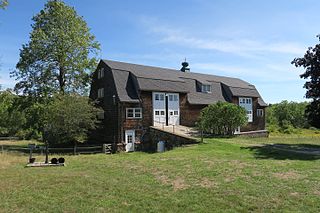
Wachusett Meadow Wildlife Sanctuary is a 1,135 acres (459 ha) wildlife sanctuary located in Princeton, Massachusetts, owned by the Massachusetts Audubon Society. Charles T. Crocker III donated 600 acres of land along with several buildings to Mass Audubon in 1956. The former farmstead includes a nature center, 12 miles of trails through woodlands, wetlands, and meadows, and a large pond with canoe rentals in season.
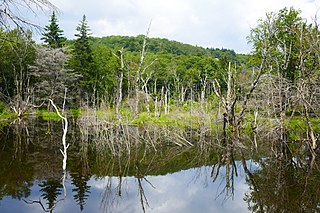
Pleasant Valley Wildlife Sanctuary is a 1,405 acres (569 ha) wildlife sanctuary located in Lenox, Massachusetts owned by the Massachusetts Audubon Society. There are 7 miles of trails and a large pond on Yokun Brook. The Overbrook Trail leads to the summit of Lenox Mountain.

Oak Knoll Wildlife Sanctuary at 1417 Park Street in Attleboro, Massachusetts is a wildlife sanctuary of the Massachusetts Audubon Society.
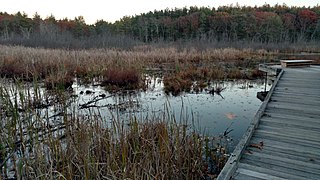
Broadmoor Wildlife Sanctuary is a 624 acres (253 ha) wildlife sanctuary located in Natick, Massachusetts. The sanctuary was created by the Massachusetts Audubon Society after donations of land in 1962 and 1968. Bird watchers have identified more than 175 species on the property.





















